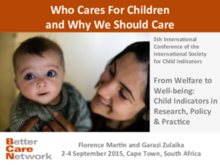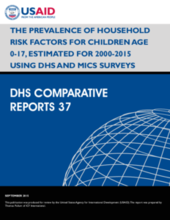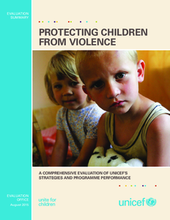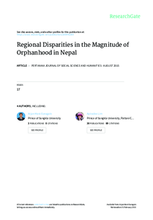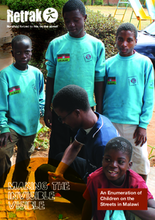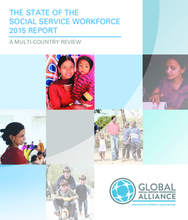Displaying 271 - 280 of 565
Florence Martin, director of the Better Care Network, presented on the need for better data on children’s living and care arrangements at the 5th International Conference of the International Society for Child Indicators: “From Welfare to Well-being: Child Indicators in Research, Policy & Practice.”
This report uses 80 surveys conducted by The Demographic and Health Surveys Program (DHS) and 55 Multiple Indicator Cluster Surveys (MICS), between 2000 and 2014 in 70 different countries, to estimate the prevalence of the components and combinations of vulnerability.
The CPC Learning Network and UNHCR are collaborating to develop and test a Child Protection Index (CPI), a measure of strength of the child protection system in refugee settings, based on UNHCR’s Framework for the Protection of Children. This report details the results of the baseline study conducted from December 2014-February 2015 in Kiryandongo and Adjumani refugee settlements, Uganda.
This report on Protecting Children from Violence: A Comprehensive Evaluation of UNICEF’s Strategies and Programme Performance was prepared by independent consultants to evaluate UNICEF's work on violence against children (VAC).
The present study aimed to identify the proportion of children who are orphans and their geographic distribution in Nepal.
On July 28, 2015, the CPC Learning Network hosted a webinar featuring Joanna Wakia, Monitoring and Research Advisor at Retrak, Charles Gwengwe, Executive Director at Chisomo Children’s Club, and Mr. McKnight Kalanda, Director of Child Affairs in the Malawi Ministry of Gender, Children, Disability, and Social Welfare.
Through this enumeration study, Retrak, Chisomo Children’s Club, and the Malawi Ministry of Gender, Children, Disability, and Social Welfare sought to address the lack of information on the number of children living and working on the streets in Malawi.
On June 29, 2015, the CPC Learning Network hosted a webinar focused on the experience of developing, piloting and refining a child protection index.
This first annual report from the Global Social Service Workforce Alliance, published on June 10, 2015, sheds light on the social service workforce, an important group of people who help to ensure that effective prevention and support services reach those who need it most.
On June 2, 2015, the USAID Center on Children in Adversity/Displaced Children and Orphans Fund hosted a panel discussion event with the CPC Learning Network to mark the tenth anniversary of the Network.

